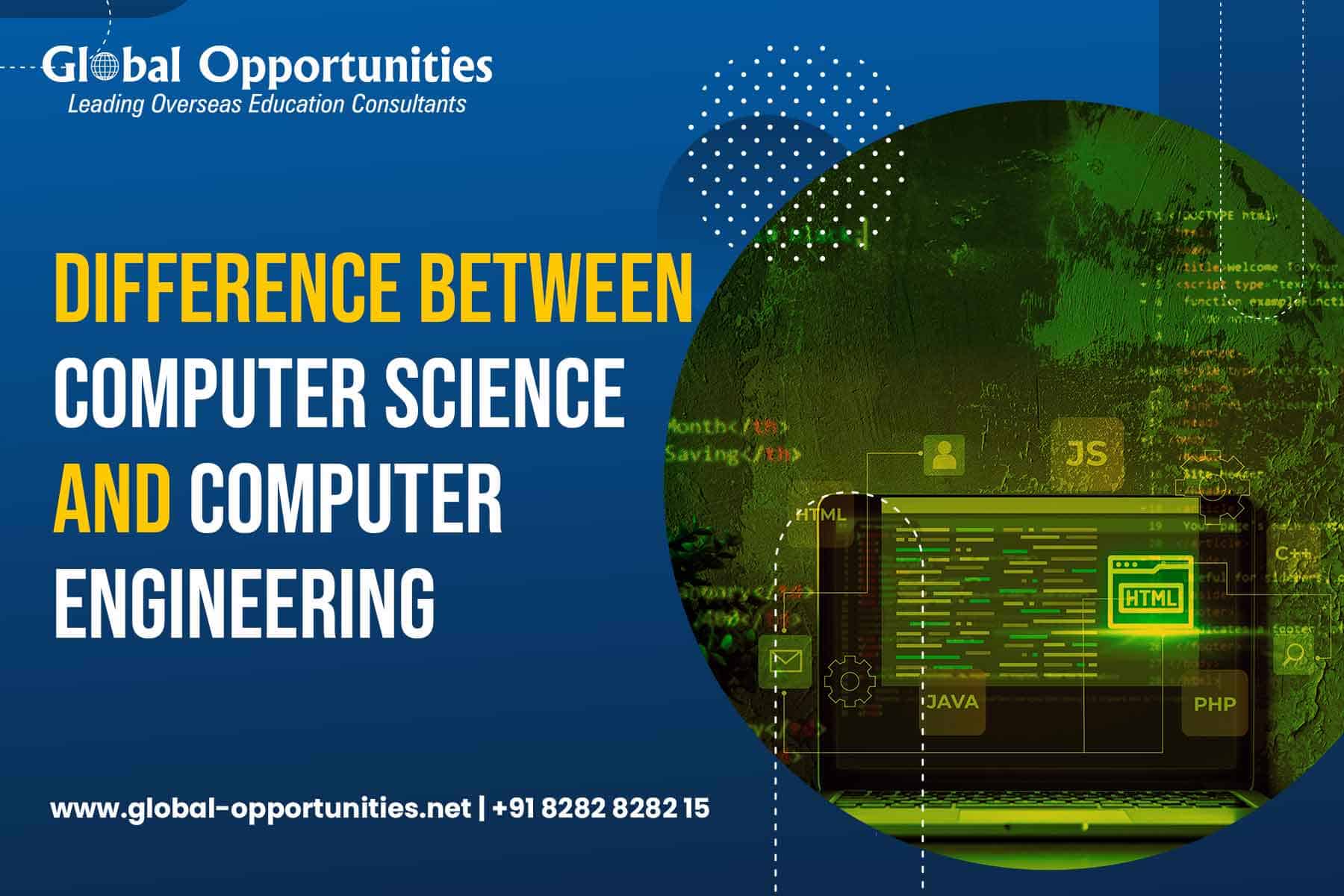Difference between Computer Science and Computer Engineering


If you are confused about deciding whether to major in computer science and computer engineering, it is very important to understand the difference between Computer Science and Computer Engineering.
| Computer Science | Computer Engineering |
| The computer science primarily deals with the theory, design, development, and application of software systems. It encompasses topics such as algorithms, data structures, programming languages, software engineering, artificial intelligence, machine learning, and computer graphics. | The computer engineering program focuses on the design, development, and integration of computer hardware and software systems. It combines principles from both electrical engineering and computer science, covering areas such as digital systems design, computer architecture, embedded systems, and hardware-software integration. |
| Some of the core subjects of computer science programs include programming languages, data structures, algorithms, theory of computation, operating systems, databases, software engineering, and computer networks. | The core subjects of computer engineering include digital logic design, computer architecture, microprocessor systems, electronics, embedded systems, signal processing, and hardware-software co-design. |
| The computer science program emphasizes software development, computational theory, and problem-solving using algorithms and data structures. It delves into the principles that underlie computation and programming. | The Computer Engineering program emphasizes both hardware and software aspects of computing systems. It involves designing and implementing computing systems that incorporate both hardware components (such as processors, memory, and peripherals) and software components (such as operating systems and device drivers). |
| In terms of career paths the graduates after completing their computer science programs get to work in the field of software development, software engineers, computer programmers, system analyst or pursue further studies in artificial intelligence, machine learning or cybersecurity. | Graduates often work as hardware engineers, embedded systems engineers, computer architects, firmware engineers, or pursue careers that involve both hardware and software development, such as IoT (Internet of Things) specialists or robotics engineers. |
| The computer science program places a significant emphasis on mathematical foundations such as discrete mathematics, calculus, linear algebra, probability theory, and mathematical logic. These mathematical concepts are fundamental for analyzing algorithms, designing efficient data structures, and understanding computational complexity. | While mathematical principles are still important, the emphasis is often more on applied mathematics, particularly in areas like digital signal processing, control theory, and circuit analysis. Computer engineering may involve more practical applications of mathematics in designing and analyzing hardware systems. |
| In terms of programming language the computer science program focuses on mastering a variety of programming languages depending on the application domain. Students may learn languages like Python, Java, C++, or specialized languages such as Lisp or Prolog based on their interests and curriculum requirements. | In comparison to computer science programs, the computer engineering program also requires proficiency in programming and low-level programming languages such as Assembly language, hardware description languages (e.g., Verilog, VHDL), and firmware development for embedded systems. |
Why Study Computer Science and Computer Engineering?
There are many reasons to consider pursuing a bachelor’s or master’s degree in the field of computer science or computer engineering. Some of the few examples includes:
- Excellent Career Outlook: As per the BLS (Bureau of Labor Stats) it is estimated that the computing and IT industry will add more than half a million jobs to the US economy over the coming decade and is also projected that it will open 546200 openings. These upcoming fields such as CE or CS, will be valued, sought-after, and in demand in an increasingly competitive economy.
- Future Potential to Work From Home: Just after the COVID-19 outbreak a lot of businesses, employees and independent contractors have moved towards independent remote work models, which is gaining popularity fastly due to the coronavirus pandemic.
- Multitude of Job Opportunities: Almost every industry has a need for tech and computer experts. Therefore, depending upon the interests and the skills that people learn as a Computer science and computer engineering major can lead to a loads of opportunities in healthcare, communications, business, marketing, fashion, education, AI and more.
What are the Types of Computer Engineering?
There are four different types of computer engineering programs, these combine the electrical and computer science principles to design, develop and maintain computer hardware and software systems. Therefore, students in computer science program would need to acquire a skillset in the following areas:
Digital Systems Design
Digital systems design focuses on the design and implementation of digital circuits and systems. This specialization involves understanding the principles of digital logic design, sequential and combinational circuit design, and the use of hardware description languages (HDLs) such as Verilog and VHDL. Engineers in this field design digital systems ranging from small integrated circuits to complex microprocessors and embedded systems.
Computer Architecture
Computer architecture deals with the design and organization of computer systems at the architectural level. This includes designing the structure and functionality of computer processors (CPUs), memory systems, input/output (I/O) interfaces, and system buses. Computer architects aim to optimize performance, power efficiency, and cost-effectiveness of computer systems. They also explore emerging technologies such as parallel processing, multi-core architectures, and specialized accelerators.
Embedded Systems
Embedded systems engineering involves designing and developing computing systems that are embedded within other devices or systems. These systems are dedicated to specific functions and often operate in real-time environments with resource constraints. Embedded systems engineers work on a wide range of applications, including consumer electronics, automotive systems, medical devices, industrial automation, and IoT devices. They must consider factors such as power consumption, reliability, and real-time performance while designing embedded systems.
Hardware-Software Integration
Hardware-software integration focuses on the seamless integration of hardware and software components to create functional computing systems. Engineers in this field work on system-level design, interfacing hardware with software, and optimizing system performance. They develop device drivers, firmware, and middleware to facilitate communication between hardware components and software applications. Hardware-software integration is crucial for designing modern computing platforms, including desktop computers, mobile devices, and embedded systems.
What are the Types of Computer Science Programs?
Just like computer engineering programs there are also four different types of computer science programs which includes:
General Computer Science
General Computer Science programs provide a broad foundation in computer science principles and theory. They cover core topics such as programming, algorithms, data structures, computer architecture, operating systems, software engineering, databases, and computer networks. Students in these programs gain a well-rounded understanding of various aspects of computer science, preparing them for diverse career opportunities in software development, systems analysis, research, or further study in specialized areas.
Specialized Tracks
Many Computer Science programs offer specialized tracks or concentrations that allow students to focus on specific areas of interest within the field. These tracks may include:
- Artificial Intelligence and Machine Learning: The artificial intelligence and machine learning focuses on developing intelligent systems, algorithms, and machine learning techniques for tasks such as pattern recognition, data mining, natural language processing, and robotics.
- Cybersecurity: The cybersecurity concentrates on techniques for protecting computer systems, networks, and data from security threats, including cryptography, network security, ethical hacking, and cybersecurity policy.
- Data Science and Big Data: Data science and big data techniques are used for analyzing and interpreting large datasets to extract valuable insights and support decision-making processes, including data mining, machine learning, statistical analysis, and data visualization.
- Software Engineering: The software engineering course focuses on the principles and practices of software development, including requirements analysis, design, implementation, testing, and maintenance of large-scale software systems.
Interdisciplinary Programs
Some Computer Science programs offer interdisciplinary or joint degree programs that combine computer science with other fields of study. These programs provide students with a unique blend of skills and knowledge from multiple disciplines. Examples include:
- Computer Science and Mathematics: Integrates computer science with advanced mathematical concepts such as discrete mathematics, calculus, and probability theory, preparing students for careers in areas such as cryptography, algorithm analysis, or mathematical modeling.
- Computer Science and Biology: Combines computer science with biology to explore interdisciplinary research areas such as bioinformatics, computational biology, and biomedical informatics, addressing challenges in genomics, proteomics, and medical imaging.
- Computer Science and Business: Integrates computer science with business and management concepts, preparing students for roles in technology entrepreneurship, IT consulting, project management, or business analytics.
Research-Oriented Programs
Research-oriented Computer Science programs focus on training students for careers in academic research, industrial research labs, or advanced research and development positions. These programs emphasize research methodologies, experimental design, and critical thinking skills, and often require students to conduct original research and publish their findings. Graduate-level programs such as Master of Science (MS) and Doctor of Philosophy (Ph.D.) in Computer Science typically fall into this category.
Conclusion
In conclusion, while computer science and computer engineering share some overlapping areas, they represent distinct disciplines with unique focuses and objectives. Computer science delves into the theoretical foundations, algorithms, and software systems that underpin computing technology, emphasizing abstraction, problem-solving, and algorithmic thinking. On the other hand, computer engineering integrates elements of electrical engineering and computer science to design and develop hardware and software systems, emphasizing the physical components and their integration into functioning computing systems. Understanding the nuances between these disciplines is crucial for individuals seeking to embark on careers or academic pursuits within the broad and ever-evolving field of computing. Ultimately, both computer science and computer engineering play integral roles in shaping the advancement of technology and innovation in our modern society.
FAQs
Which is better computer science or computer engineering?
A major difference between computer science and computer engineering is that computer science is more theoretical and a better fit for people who enjoy doing research, analyzing and strategizing, while Computer Engineering is more practical. It’s more suitable for people who love to build things with their own hands.
Which pays more computer science or computer engineering?
The earning potential varies based on your job title, yet both career paths offer lucrative opportunities. As per the Bureau of Labor Statistics (BLS), the median salary for computer and information research scientists was $136,620 as of May 2022. Similarly, computer hardware engineers earned a median salary of $132,360.



